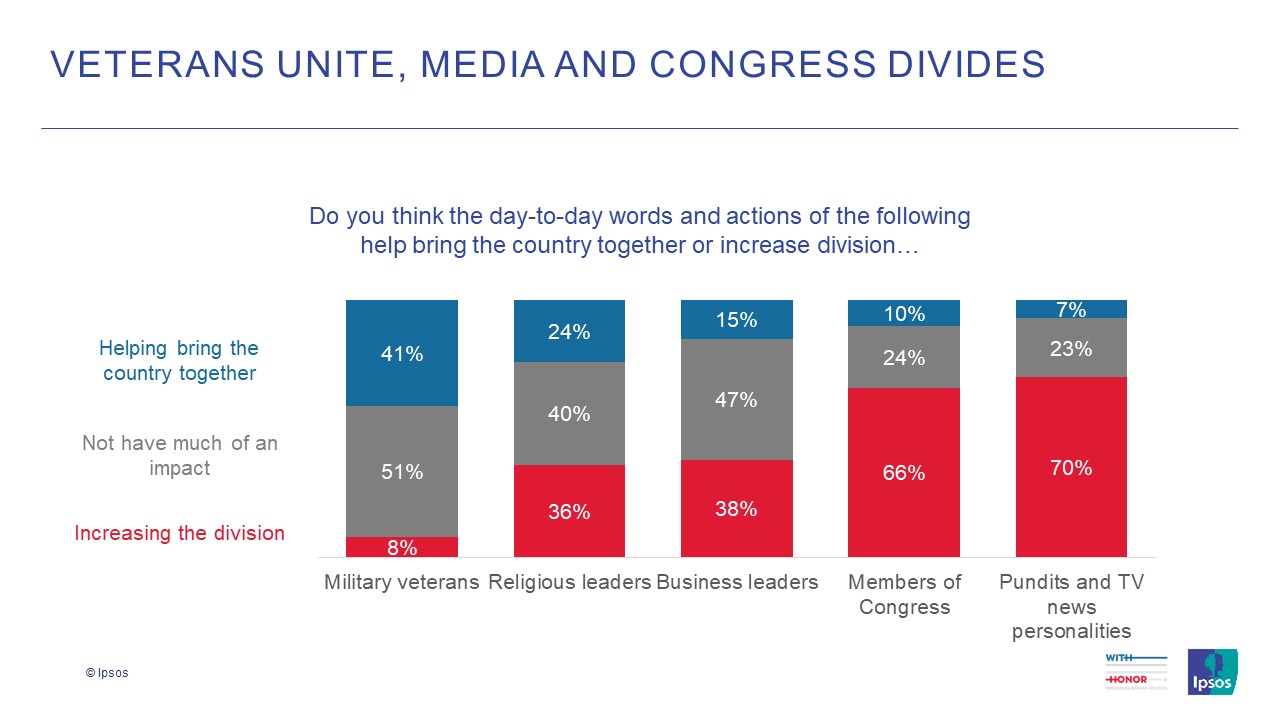Americans view country as deeply divided, but believe most have much in common
Washington, DC, April, 29, 2024 – A recent survey of Americans by Ipsos on behalf of With Honor shows that most Americans see a country with great and increasing division, but also many believe Americans have much in common with one another. The survey data was used to create the Unity Index which shows appreciation of public service and shared core values unite Americans, and most view the media and politics, and politicians unfavorably.
Detailed Findings
- Eighty-one percent of Americans say America is more divided than united. Partisans have the same perceptions of division, with 82% of Republicans, 80% of Democrats, and 81% of independent viewing America as more divided than united. Fewer than one in five Americans (18%) say the country is more united than divided.
- The also survey asked if Americans believe the country is more or less united than ten years ago. Seventy-eight percent say the country is less united, 18% say it is about the same as it was ten years ago, and just 4% say it more united. Republicans (85%) are more likely than Democrats (77%) and independents (79%) to say the country is more divided.
- Despite the pervasive belief that America is more divided now than ten years ago, about seven in ten Americans (69%) say that most Americans want the same things out of life, compared to 29% who say that most Americans want radically different things out of life. A similar proportion of Republicans (68%), Democrats (71%) and independents (72%) believe that Americans want the same things in life.
- Most believe that members of Congress (66%) and pundits and TV news personalities’ (70%) day to day words and actions increase the division in the country, while about one in ten believe that they help bring the country together (10% and 7%, respectively) and about a quarter (24% and 23%, respectively) believe their words and actions don’t have much of an impact. A plurality of Americans (41%) believe that military veterans’ words and actions help bring the country together – the most uniting group of those the survey tested. Fifty-one percent believe that their words and actions don’t have much of an impact, and 8% say veterans increase division. One third of Americans believe that religious leaders (36%) and business leaders (38%) words and actions increase division. A quarter of Americans believe that religious leaders help bring the country together and 40% say there is not much of an impact. Fifteen percent say business leaders help bring the country together, while 47% say they do not have much of an impact.

- The Unity Index shows that American values, service occupations, civility, the military, historic figures, national service, bipartisanship, “principles before politics”, being patriotic, and sacrifice are both popular and uniting. Mainstream news, both national Republicans and national Democrats, and Fox News are seen as both unpopular and divisive.
- Since 2018, with an initial Ipsos survey, perceptions of the following are both highly favorable and improving: being bipartisan (up 14 points since 2018 to 56% net favorable), pioneering (up 13 points from 2018 to 68% net favorable), and community (up 12 points from 2018 to 88% net favorable).
- Since 2018, several items have also declined. Those that remain favorable but have seen a shift downward include diversity (77% net favorability in 2018 and 64% in 2024), being patriotic (75% net favorability rating in 2018, and 66% in 2024). Some items had low net favorability ratings in 2018 and have also declined, including Elon Musk (+36% percent net favorability in 2018 and -8% in 2024), and Fox News (+6% net favorability in 2018 and -26% in 2024).
About the Study – Wave 1
This Ipsos poll was conducted January 3-7, 2024, by Ipsos for With Honor using the probability-based KnowledgePanel®. This poll is based on a representative probability sample of 2,027 general population adults age 18 or older in the United States.
The margin of sampling error for this study is plus or minus 2.45 percentage points at the 95% confidence level, for results based on the entire sample of adults. The margin of sampling error takes into account the design effect, which was 1.26. The margin of sampling error is higher and varies for results based on other sub-samples. In our reporting of the findings, percentage points are rounded off to the nearest whole number. As a result, percentages in a given table column may total slightly higher or lower than 100%. In questions that permit multiple responses, columns may total substantially more than 100%, depending on the number of different responses offered by each respondent.
The survey was conducted using KnowledgePanel, the largest and most well-established online probability-based panel that is representative of the adult US population. Our recruitment process employs a scientifically developed addressed-based sampling methodology using the latest Delivery Sequence File of the USPS – a database with full coverage of all delivery points in the US. Households invited to join the panel are randomly selected from all available households in the U.S. Persons in the sampled households are invited to join and participate in the panel. Those selected who do not already have internet access are provided a tablet and internet connection at no cost to the panel member. Those who join the panel and who are selected to participate in a survey are sent a unique password-protected log-in used to complete surveys online. As a result of our recruitment and sampling methodologies, samples from KnowledgePanel cover all households regardless of their phone or internet status and findings can be reported with a margin of sampling error and projected to the general population.
The data for the total sample were weighted to adjust for gender by age, race/ethnicity, education, metropolitan status, and household income, political party identification, and 2020 presidential vote. The demographic benchmarks came from the 2023 March Supplement of the Current Population Survey (CPS), political party benchmarks came from high quality telephone polls, and the official 2020 election results came from the Federal Election Commission.
About the Study – Wave 2
This Ipsos poll was conducted February 2-4, 2024, by Ipsos for With Honor using the probability-based KnowledgePanel®. This poll is based on a representative probability sample of 1,021 general population adults age 18 or older in the United States.
The margin of sampling error for this study is plus or minus 3.2 percentage points at the 95% confidence level, for results based on the entire sample of adults. The margin of sampling error takes into account the design effect, which was 1.11. The margin of sampling error is higher and varies for results based on other sub-samples. In our reporting of the findings, percentage points are rounded off to the nearest whole number. As a result, percentages in a given table column may total slightly higher or lower than 100%. In questions that permit multiple responses, columns may total substantially more than 100%, depending on the number of different responses offered by each respondent.
The survey was conducted using KnowledgePanel, the largest and most well-established online probability-based panel that is representative of the adult US population. Our recruitment process employs a scientifically developed addressed-based sampling methodology using the latest Delivery Sequence File of the USPS – a database with full coverage of all delivery points in the US. Households invited to join the panel are randomly selected from all available households in the U.S. Persons in the sampled households are invited to join and participate in the panel. Those selected who do not already have internet access are provided a tablet and internet connection at no cost to the panel member. Those who join the panel and who are selected to participate in a survey are sent a unique password-protected log-in used to complete surveys online. As a result of our recruitment and sampling methodologies, samples from KnowledgePanel cover all households regardless of their phone or internet status and findings can be reported with a margin of sampling error and projected to the general population.
The data for the total sample were weighted to adjust for gender by age, race/ethnicity, Census region, education, household income, and 2020 presidential vote. The demographic benchmarks came from the 2023 March Supplement of the Current Population Survey (CPS). The official 2020 election results came from the Federal Election Commission.
About Ipsos
Ipsos is one of the largest market research and polling companies globally, operating in 90 markets and employing over 18,000 people.
Our passionately curious research professionals, analysts and scientists have built unique multi-specialist capabilities that provide true understanding and powerful insights into the actions, opinions and motivations of citizens, consumers, patients, customers or employees. Our 75 solutions are based on primary data from our surveys, social media monitoring, and qualitative or observational techniques.
Our tagline "Game Changers" sums up our ambition to help our 5,000 customers move confidently through a rapidly changing world.
Founded in France in 1975, Ipsos has been listed on the Euronext Paris since July 1, 1999. The company is part of the SBF 120 and Mid-60 indices and is eligible for the Deferred Settlement Service (SRD).ISIN code FR0000073298, Reuters ISOS.PA, Bloomberg IPS:FP www.ipsos.com



